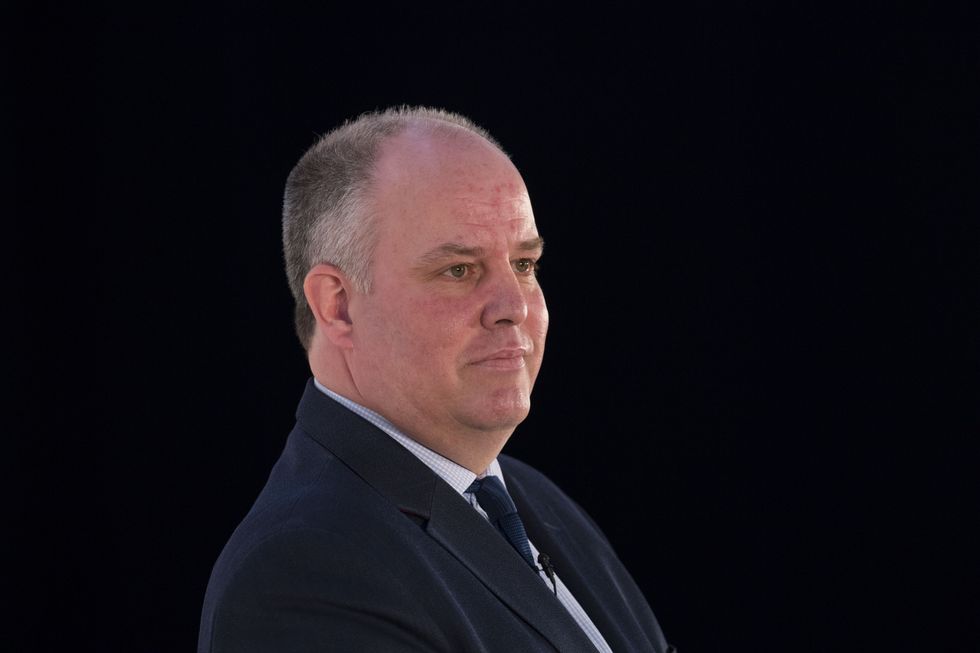Inside fresh plot to BREAK-UP UK as Starmer risks leaving Union ‘hanging by thread’

Keir Starmer and Mark Drakeford have been blamed by Conservatives for events in Wales
|GETTY

In this members-only feature piece, GB News takes a closer look at the threat posed to the UK by a less prominent separatist movement
Don't Miss
Most Read
The future of the United Kingdom is seemingly always at stake.
The Scottish National Party continuously threatens to split from the 317-year-old Union by holding yet another divisive independence referendum and Northern Ireland’s place is increasingly in jeopardy as the Protocol erects a sea border between Ulster and Great Britain.
However, Wales is all too often overlooked in any discussion about Unionism.
The Principality, made up of three million rightfully proud residents, maintains its own distinct culture and traditions.

Protestors walk through Queen Street during a march in support of Welsh Independence
|GETTY
Despite a distinct difference from England, Wales remains the most pro-Union Celtic corner of the UK and in terms of the judicial system Cardiff is far more intertwined with London than either Edinburgh or Belfast.
Opinion polls place support for Welsh independence in 2024 at just 27 per cent, well below the 43 per cent currently favouring Scottish separatism and 39 per cent backing Irish reunification.
However, Mark Drakeford’s Welsh Labour Government is shifting towards a much more anti-Westminster position.
Perhaps the position comes from historic anti-Tory sentiments but the recent release of the Independent Commission of the Constitutional Future of Wales’ report highlights how separatism is gathering salience.
Last month’s report, co-chaired by Professor Laura McAllister and former Archbishop of Canterbury Dr Rowan Williams, claimed independence is a “viable” option for Wales.
Responding to the report, the outgoing Welsh First Minister said: “The report does indeed say that independence is a viable option but in some ways that’s not the real question, is it?
“It’s not whether it’s viable, it’s whether it’s desirable. And I am very clear, the reason I don’t believe in independence is because I don’t think it’s desirable for Wales.”
He also reignited calls for further devolution to Cardiff Bay after labelling the report, which called the status quo “unsustainable”, a “triumph”.
Despite his soft-Unionist response, Drakeford was forced to swat away the suggestion he was IndyCurious in the wake of the UK’s decision to vote to leave the European Union.
Drakeford continuously bashes Brexit, a decision supported by 52.5 per cent of voters on the other side of the Severn Bridge, and even suggested farmers reaped what they sowed by opting to cut ties with the Brussels bloc.
Welsh Tory leader Andrew RT Davies is clear about why he thinks Labour poses a threat to Unionism in Wales.

First Minister of Wales Mark Drakeford and Labour Party leader Keir Starmer at a Down To Earth project site
|GETTY
He told GB News: “Labour is a clear and direct threat to the Union. This may sound bizarre, as polling for separatism is very low in Wales. Most Welsh people are proud Brits.
“And they think the Labour Government’s report into the viability of independence was a complete waste of time and money. To them, it’s just another distraction Labour have put in place, when they should be focused on the Welsh health service, education system and crumbling transport network.
“But Labour's constant agitation for more and more powers to Cardiff Bay, manifested in the report, is a direct threat to our Union. It’s changed Labour from a proudly unionist party into one that is at best ambivalent and at worst hostile to the Union.
“If Keir Starmer ever gets into Downing Street, he will open the floodgates, and within a few short years we’ll find our Union hanging on by a thread.”
The unrepentant Unionist, who also expressed fears about Cardiff Bay’s stance on farming and 20mph zones, added: “Mark Drakeford has been very damaging to Unionism in Wales. His constant calls for more powers to Cardiff Bay give momentum to those who wish to break our Union apart piece by piece.
“Conservative ministers have rightly ignored Drakeford’s calls, but they’ve been key in moving the party away from unionism and towards Welsh nationalism. In Wales, Labour has a close alliance with the Welsh nationalists, with whom they serve in a cooperation agreement.
“This means that any future Labour Government puts the Union at risk. Whatever Keir Starmer says now, as Prime Minister he will likely buckle to the calls of Welsh nationalists within and outside the Labour Party.
“That’s why we must ensure he is defeated. Both leadership candidates represent more of the same, so this threat will continue whoever succeeds Drakeford.”
However, Starmer has stressed that under his leadership Labour “believes very strongly in the union”.
There is also the sincerely held view, similar to one held in Scotland, that a Labour occupant in Downing Street would bolster Unionism by diminishing the saliency of anti-Tory sentiment.
Labour has come out on top in every general election contested in Wales since 1922, with the Tories even witnessing a Welsh wipeout in the Blair years.
 Welsh Tory leader Andrew RT Davies | GETTY
Welsh Tory leader Andrew RT Davies | GETTY Having never returned a majority of Conservative MPs, Wales is historically more anti-Tory than Scotland, with Winston Churchill and Anthony Eden claiming victories north of the border in the 1950s.
It’s hard to argue, given Wales’ aversion to Tory politics, that Starmer’s Unionist credentials won’t hamper any long-shot independence campaign.
With a left-of-centre Government, ideally delivering on its manifesto commitments, Wales could potentially find itself with a supported and approved of Prime Minister for the first time in more than a decade.
However, Starmer has also been warned against becoming “King Canute” by dismissing calls for Westminster to transfer more powers to Cardiff Bay.
Brecon & Radnorshire Senedd Member James Evans echoed Davies’ fears about Labour giving constitutional matters more credence than bread-and-butter policy areas.
He said: “I think for Welsh Labour they see it as a way they can attract some of the Plaid Cymru vote. It could undermine Plaid and pull some of their voters across. I think that's what they're trying to play the game at. I think some of the candidates in the leadership race aren't like that. I think Vaughan Gething, for example, favours a more federal United Kingdom. I think the same probably applies to Jeremy Miles.”
Evans, who also issued a warning about Cardiff Bay’s controversial agricultural agenda, added: “I want to be clear that I don't think that the country is IndyCurious at all. Certainly with the people I speak to, it is one of the lesser priorities.
“Recent polls are even showing that less people now would want an independent Wales. I don't think it's a matter that people should be concerned about and what the Welsh Government should be doing is delivering an NHS, education system and an economy that's strong and supports public services.
“They're failing on all those fronts and they use these constitutional matters to detract from the real issues that people care about.”
However, a prominent Welsh Unionist who played a leading role in the pro-Brexit Vote Leave campaign was scathing about the complacency shown by Conservatives.
They told GB News: “I think every Unionist MP and Senedd Member should hold their head in shame because they like to talk-the-talk, but they don’t walk-the-walk. They like to slam Labour and slam Plaid but they don’t do anything. When it comes to mobilising, they couldn’t organise a p**s up in a brewery.”

A general view of Cardiff Bay at night showing the Pierhead Building (C) and Senedd (R), home of the Welsh Parliament
|GETTY
The Unionist, who warned Wales is at risk of sleepwalking to independence in the next 20 years, added: “Unionists have failed to realise that the whole independence movement is against Westminster. When Westminster isn’t working, and it’s currently not working for the whole of the UK, it plays into nationalist hands. They’re just lucky that in Scotland the SNP has been such a disaster it hasn’t had the same impact there.”
Despite Conservative concerns about Drakeford and Cardiff Bay, Labour’s Shadow Welsh Secretary Jo Stevens voiced her dismay about the Tory Party’s rhetoric.
The Cardiff Central MP told GB News: "These are desperate comments from a man [Andrew RT Davies] grasping at straws.
"Labour is proudly committed to maintaining and strengthening our United Kingdom.
"Andrew's memory seems to be a bit short. Reckless comments about our allies and legislation that violates devolution and breaks international law means the biggest threat to the Union is the Tory Party."
Irrespective of the debate about whether Labour is or isn’t proudly Unionist, questions remain over whether independence is economically viable.
Wales annually exports £26billion to the rest of the UK and imports £27billion worth of goods.
In comparison, recently released data shows the total dwarfs Wales’ exports and imports to the Brussels bloc at £11.6billion and £7.7billion respectively.
The Land of My Fathers also receives more total public spending per head than England, at £13,967 compared to £12,227 last year.
While the outdated Barnett Formula continues to benefit Scotland and Northern Ireland to an even greater degree, who is to say Wales could fund its spending commitments on its own?
With a pre-pandemic deficit of 18 per cent, well-above the three per cent figure mandated to join the EU and significantly higher than the 0.3 per cent recorded in England at the time, there’s only one real answer to how Wales could survive as an independent nation; unprecedented tax rises.
GB News approached Welsh Labour, the Welsh Government and Plaid Cymru for comment.










